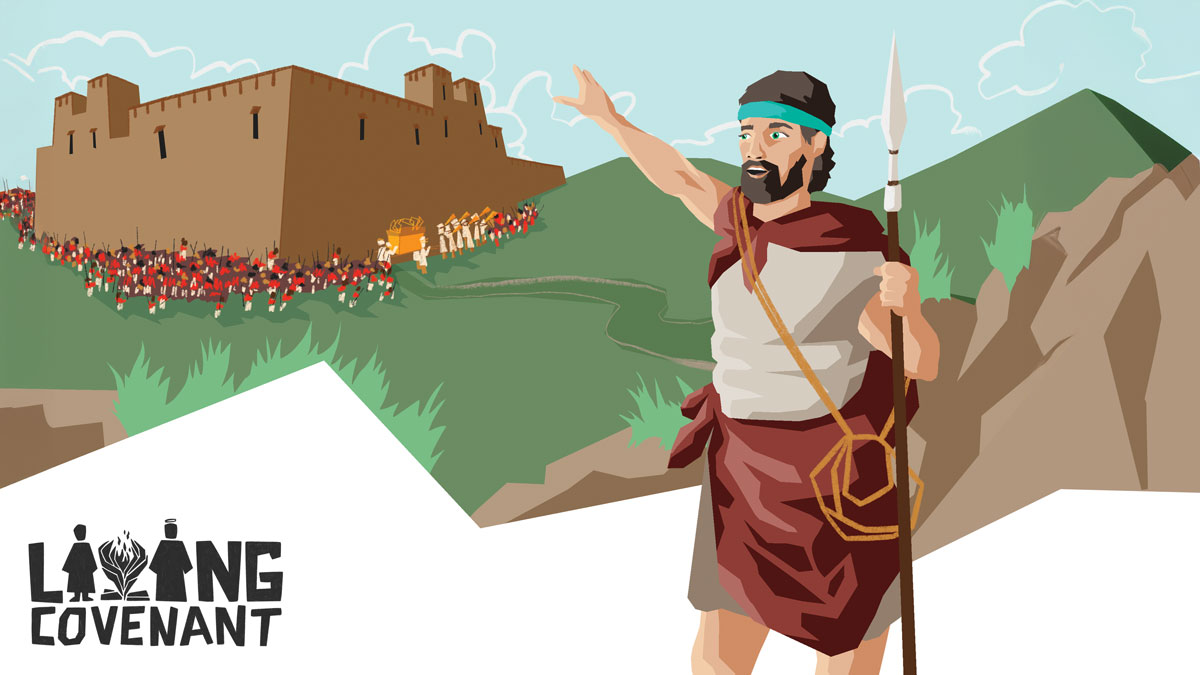The weather was chilly and the air smelt like fresh laundry. I was sitting on the top level of a double-decker bus in the middle of San Francisco, when I saw a wall, marked with the inscription: “Listen to the wall.” Quite an interesting thing to say about something that does not speak. What could a wall tell me? It got me thinking about another wall with quite a story to tell. A wall that reveals the importance of trusting in God.
The Bible shares a story of how a wall was getting in between the Israelites and the Promised Land. The book of Joshua chapters 5 and 6 highlights God’s first official task for newly appointed leader Joshua—to overtake a kingdom city with a great, big wall.
Prior to Joshua’s time, his ancestor Abraham had already set foot on the Promised Land. However, it was not yet his time to possess it as God was giving allowance to the people of Canaan to repent of their sins (Genesis 15:16). Canaan was a big region that had kingdoms like Jericho within its territory, and ultimately their lack of repentance led to their demise.
Joshua sets out to conquer Jericho, well-known at that time for having well-fortified walls as their main line of defence. It was the only way the Children of Israel could enter Canaan and Jericho had to be defeated so they wouldn’t have an enemy at their back. Unless the Israelites had explosives, traditional spears, swords and arrows would do no damage to that wall. Imagine being in Joshua’s shoes. I’m sure a million questions would have entered his mind—starting with the hows, whys and whats.
However, it would have never been the solutions that he came up with, as a leader, that would give victory to the Israelites. It was solely trusting in God’s clear instructions found in Joshua 6:3-5.
Step 1: Once a day for six days you shall march around the city, all the men of war circling the city once.
Step 2: Even priests shall carry seven trumpets [made] of rams’ horns ahead of the ark.
Step 3: On the seventh day you shall march around the city seven times, and the priests shall blow the trumpets. When you hear the sound of the trumpet, all the people shall cry out with a great shout and the wall of the city will fall down and you shall conquer.
Unusual? I couldn’t agree more. Anyone in their right mind would not expect to see a megalith structure fall by marching around it silently for six days before sounding the trumpets and shouting at the end. But it worked—the Israelites followed through and the walls came tumbling down. Archaeologists have discovered the remains of walls in that precise region, carbon dated to have been there during Joshua’s time.
But what if this narrative was more than just a historical account? What if it is a personal, spiritual blueprint that provides a solution to your deepest problems?
When I was an undergrad student at Fulton Adventist University College, Fiji (2021-2023), my wall was financial struggle: how would I pay off my school fees? Since kindergarten, I was an average student who people saw little to no potential in. I was lucky to make it to college.
I come from a family of eight with, at that time, only one breadwinner. One parent was paying for all our fees, as well as everyday living expenses. Facing that wall, there was only one instruction from God, that my parents would tell us children from Matthew 6:33. The verse stuck in my head: “Seek first the Kingdom of God and His righteousness and all these things shall be added to you.”
As a kid I saw rich people excel because of the number of hours they put into their work, meetings they attended and the businesses they set up around the country. I wanted to do the same so I could relieve my family from all their struggles—starting first by paying my own school fees. I battled between the conventional methods of this world versus God’s method, to achieve excellence. But my parents’ voices continued to echo in my mind: “Seek first God’s kingdom.”
Consequently, I decided to prove to myself that God is truly real and that He keeps His promises. With nothing to offer Him but my life, I submitted it to Jesus. That meant all my future and present plans and actions. “Not my will but your will God” has been my prayer since. I had faith that, ridiculous though it may seem to the world, God would still provide my school fees.
As my wall stood firm in front of me, I had faith that God would soon make it fall. He did! God led Spirit-filled individuals to pay for my fees each school term. Before me I saw my wall crumble to bits.

Interestingly, God’s method was profound. At the end of every school term, He would allow for me to go through a period of testing and tribulation. These tests varied from sickness, potential moral downfalls, mental health issues, etc. As these issues came, some nearly made me lose faith. However, through the rough times, as I called out to God, He would help, comfort and remind me to trust in Him alone.
The story of Joshua has timeless lessons that can help us manoeuvre through the walls that deter us from reaching our God-given destiny.
Firstly, we must know who our God is. The Collinsworth family sing the lyric, “You tell that mountain just how big your God is!” Walls come in different sizes. However, we serve a God who is greater than our walls. Whether the issues we battle within ourselves are financial, emotional, physical or too overwhelming, with God there is an assurance of guidance, comfort and providence. Even in death, the greatest wall, God gives us hope through Jesus.
Next, we must follow God’s instructions and methods, even though they may be unpopular. The worldly system prompts us to defy God’s precepts and view them as ridiculous. However, God used an unusual method to destroy my wall—and the great wall of Jericho. My experience has taught me that it is much safer for me to trust in God’s instructions. Jesus encourages us to receive eternal life through accepting His sacrifice. That’s it! Yet, although easy, it is unpopular. Jesus Himself states that “only a few find it” (Matt 7:14b). Let us do the same thing Joshua did— follow God’s instructions.
Finally, we must depend on God. I’m not saying do nothing and be a couch potato. Instead, while you go about your daily tasks, depend on God to give you the knowledge and wisdom to make the necessary decisions and meet the needs of that day.
It took me a while to depend on God. Like many others I wanted to solve my own issues, fight my battles and conquer my fears. Independence was my word. But I kept on spiralling into disappointment, dissatisfaction and disobedience. Joshua’s predecessor Moses did not make it to the Promised Land because he, at one point, depended upon himself (Numbers 20:12).
Profoundly, the Israelites would identify God as יְהוָה יִרְאֶה translated Jehovah Jireh—”all their needs God will provide”. With the root word for God’s name being “YHWH” (to be, to cause, to come to pass), encompassing past, present and future, the name could best translate to “God has provided, God provides, God will provide.”
The apostle Peter encourages us to depend on Him and to cast our burdens unto Him (1 Peter 5:7).
As we face difficulties and overwhelming experiences that tie us down, may we run to God for help because He is greater than our walls. His methods are best to overcome any problem and He provides all our needs. Kneel before God today. He’s waiting to fight for and with you. Let your wall be the starting point of your testimony, not your tombstone.
Dawn Ravulo is the Adventist Student Association (ASA) chaplain Fiji-wide and Pacific Tertiary Evangelist Centre (PTEC) church associate minister in Fiji.






